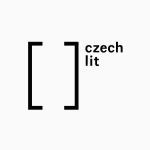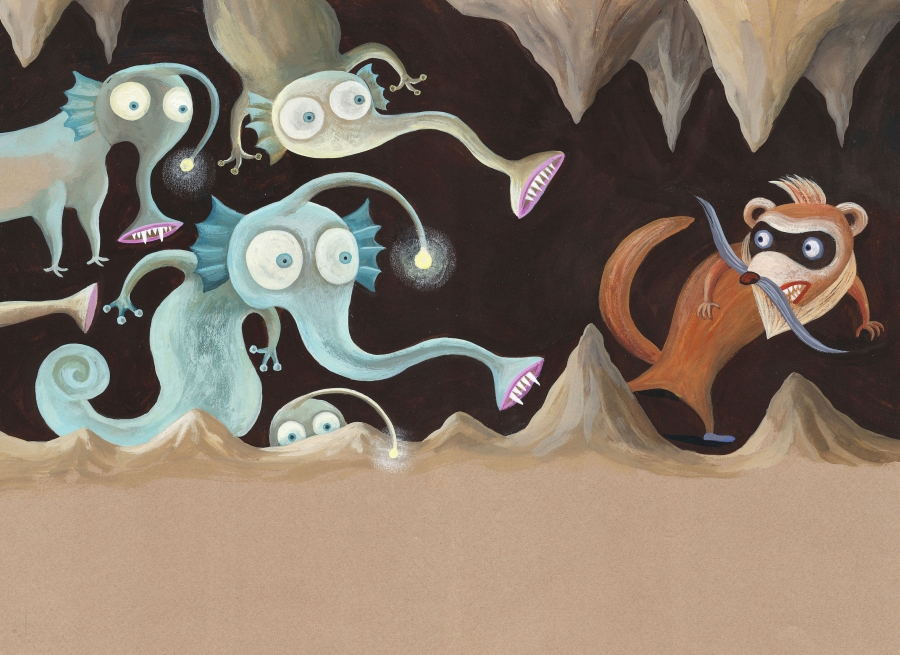In July we are presenting a selection of some of the best Czech books published in the past six months. These eight books cover literary fiction and poetry as well as genre fiction and books for children. Whether you are a publisher, translator or reader, here you will find everything in one place — synopses, praise from the Czech press and translated excerpts in English.
Contents
Chaim Cigan: Puzzle
Zuzana Brabcová: Aviaries
Zuzana Lazarová: Iron Shirt
Petra Dvořáková: The Net
Michal Sýkora: It’s Not Over Yet
Petra Stehlíková: The Listener
Jan Novák & Jaromír 99: Zátopek
Petr Stančík: Chrujda the Badger Found his Great Love
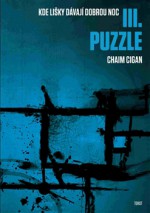
Chaim Cigan
Puzzle
(Torst, 504 pages)
Karol Sidon, author and Chief Rabbi of Prague, writes under the pen-name Chaim Cigan, as we are now aware, although when he published the first part of his tetralogy Out in the Sticks (Kde lišky dávají dobrou noc), Altschul’s Method (Altschulova metoda), under this ambiguous pseudonym, almost the entire Czech Republic made a big adventure out of searching for the author, for at the time the book came as a revelation… Puzzle is the third part of the tetralogy, combining science-fiction elements, adventure, mystery, philosophy and humour. The heroes of the series are trying to understand the implications of an experiment which lead to time-travel, the creation of parallel worlds and an infinite number of human copies. Those responsible for the original phenomenal discovery are struggling to reverse the effects of scientific temptation which led them to irresponsibly use the discoveries of their unleashed intelligence. Sidon’s books have come out in Polish and Dutch. We believe this is a long-term sure-fire bet.
Praise
“Sidon remains a master of dialogue and depicting the tension between the conventional and the erotic.”
— Milan Ducháček, Respekt
Links
Author website: www.karolsidon.com
Publisher: www.torst.cz
-
Excerpt ▼
Meanwhile Alexandra examined the picture that he was hiding from her in his study. Above all she was surprised to see herself in it. The figures, the red telephone kiosk and the blue horse did not arouse such anxiety in her. She could not recall when she had last reminded her husband to take Lidrunal. She immediately called the museum, but her husband was not there. She did get through to Filip, who often slept over at work there.
She found out that in the afternoon Moshe had run off to Casablanca for a meeting with the Rabbi. She threw a coat over herself and asked Leon to take care of the children. She wasn’t even sure how she made it from home to Na Příkopě. She ran through the halls of the Savarin Palace, outside which the Hebrew Casablanca sign was lit up, and from a distance she saw in the open courtyard two figures lit up by the neon, sitting behind a table with a bottle of wine.
She recognized the first as the Rabbi, but she did not know the second one. With feigned composure she sat down beside them, as if she were just stopping by by chance, and she asked: “Has my husband been here?”
The Rabbi nodded, pushed his glass in her direction and poured wine from the bottle.
“You must have passed each other on the street. He just left a few minutes ago. We’re on our way too.”
Větrovec had meanwhile taken off his Moroccan costume, but even without the make-up he did not make a good impression. She pinioned him with a hostile gaze, making it clear that he ought to leave. It surprised her how quickly he understood and blew away like a burning sheet of paper. She drank up the contents of the glass and looked at the Rabbi enquiringly. “What did my husband want with you?”
“I needed to talk to him about work. I’m looking for a replacement Mashgiach for this restaurant. I’m afraid the chap who was sitting here is useless.”
“I wouldn’t trust him with a hat, never mind supervision of a restaurant,” she said in a huff.
“Is something the matter?” Charlie asked.
“I don’t know,” Alexandra said. She hesitated to confide in the Rabbi but then asked:
“Did Moshe make any sense?”
“Sure,” Charlie pondered, averting his gaze, “until that phone call. And then he didn’t even say goodbye and just left.”
“Telephone call?” She was on her feet immediately, as she recalled the telephone kiosk in the picture. Telephone kiosks are not usually in forests. What’s more it was red, and they have red kiosks in Britain. “Who was calling him?” she blurted out.
“I have no idea,” said the Rabbi, but that was as she was leaving. “Is something the matter?” he called after her, but her rapidly receding little figure was lost in the dark underpass.
“Good Lord,” she prayed, “let him just be at home, let him be home, everything else is irrelevant.” She cursed herself out loud for not keeping a watch on him as she should have done, leaving him without his Lidrunal at the mercy of his delusions.
When she was hurrying out of her apartment, she had forgotten to take her keys, so she had to ring the front door bell. “Is dad home?” she blurted into the mouthpiece when Frederik answered.
“He’s home,” answered her son.
“Thank God! And where is Uncle Leon?”
“He’s left again.”
She climbed the dark staircase two steps at a time.
(Translated by Melvyn Clarke)
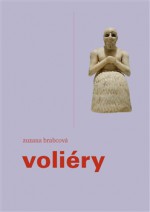
Zuzana Brabcová
Aviaries
Voliéry
(Druhé město, 128 pages)
Aviaries is a posthumously published text from the recently deceased author of one of the first Czech novels to openly describe lesbian relations, Year of Pearls, which has been translated into many languages. Aviaries is an intimate diary account of neurotically oversensitive perception of the world around us. As in her previous works, here too Brabcová works bewitchingly with the language, pulsating from bare recording to supreme metaphoricalness, from lyrical tropes to vulgarity, revealing motifs of being alone and lost in a world that has ceased to make sense. The everyday entries shift to more general and symbolic testimonies. They do not philosophize but cause shock by revealing the grotesque – as if the present generated nothing but black humour, the bizarre, the pompous and the void. The pilgrim has examined the world and now has nowhere to go. There is no longer any paradise of the heart, her own interior world… Brabcová is a Magnesia Litera prizewinner and the first ever Jiří Orten Award winner. Aviaries is a black pearl.
Praise
“This sophisticated testimony of social exclusion oscillates between the diary genre, dream entries and fantasy prose.”
— Petr Bílek, Literární noviny
Links
Foreign rights: www.pluh.org
Publisher: druhemesto.cz
-
Excerpt ▼
20th December 2011
It comes on around four or five in the afternoon, sets in around seven and then takes over for the night. It’s been like that for years – I can’t remember it ever being any different. A day devoted to not going out is a musical score for a melody that nobody has ever played. And if I have to go out all the same, then the people that I pass by have a bloom, a glassy frosting that makes their outlines appear fuzzy; I can imagine they do not exist, and so love them. All that exists merely spoils and disturbs, as if somebody had sprayed over The Night Watch.
The day before yesterday Václav Havel died. In his sleep, in the morning hours. So it does not just take over at night.
21st December 2011
“Gosh, did I cry! I really liked him!” said the woman I bought Nový prostor magazine from at Anděl.
It was around freezing point and she had no gloves. All day long it had been around freezing point and all day she had no gloves. All day long she shuffled up and down by the bus stop.
“Why don’t you have any gloves?”
“They’re expensive,” she replied.
Her top and and bottom teeth were also missing.
They are even more expensive.
I went round the corner to the Christmas market and bought her some gloves. The little round emptiness of her face lit up, while my revulsion over my own gestures contorted me and she clenched the throat of Christmas with them.
22nd December 2011
That bloom is not only on people but also on things, while between me and them looms a mirror rampart, built into the frame at right angles. Smelling of incense, the whole shop tinkles.
I would stand behind the curtain and observe for hours and hours as Míra and Bobeš dribble the ball, a static image in motion, but I do not have a curtain.
I wipe off the dust and look at the dictionary: “Microscopic particles of matter of mineral or organic origin created by a rubbing-off process and settling as dirt.”
Something’s the matter. Something is up. Something isn’t right.
(Translated by Melvyn Clarke)
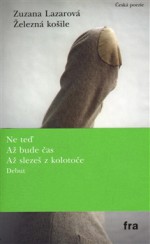
Zuzana Lazarová
Iron Shirt
Železná košile
(Fra, 40 pages)
When her debut work was published, photographer and poet Zuzana Lazarová attracted plenty of attention and was immediately nominated for the prestigious Jiří Orten Award for young writers. We have already seen some of her promise: in 2013, poetry by the then not all that well-known Lazarová appeared in the Best Czech Poetry 2013 anthology. What does she write about? Her poems definitely do not include much optimism, as the very title indicates, for an iron shirt in Czech stands for habit, but Lazarová extends the scale and sees violence where a less poetic eye would not find it. The Jiří Orten panel above all appreciated the “tension between a rational construction and a surrealistic standpoint that keeps extremes within limits.”
Praise
“The literary debut Iron Shirt cruelly reminds us how much the banal facts of everyday life bind us and what they turn us into”
— Michaela Kašičková, iLiteratura
Links
Publisher: www.fra.cz
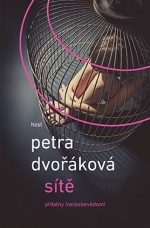
Petra Dvořáková
The Net; stories of (low) self-esteem
Sítě; příběhy (ne)sebevědomí
(Host, 320 pages)
Magnesia Litera journalism category and Gold Ribbon young adults’ fiction category award winner for Julie Among the Words (Julie mezi slovy), which is now to be translated into Slovene. Petra Dvořáková is a multi-genre professional. Her latest work is a psychological prose work about self-esteem, with three stories about how low self-esteem can affect our lives.
Kristýna and her young son have at last settled down in a relationship, with wealthy, charismatic Jáchym. The only problem is, Kristýna ‘doesn’t believe in herself much’. She starts to go to a psychotherapist, and these visits soon lead her to a dramatic realization.
Another main character, Karolína, is expecting her fourth child and finally owns up to the fact that she is repeating her mother’s hated mistakes. Her desire to break free of the influence of her religious fanatic husband, who rejects contraception out of hand, prompts her to approach the elderly Father Ambrož. But will she succeed in breaking out of the vicious circle?
Although Naďa is a nurse and frequently encounters true suffering and death, this does nothing to lessen her desire for personal perfection. Gradually she becomes a trusted but cynical businesswoman. Behind the narrative is the controversial theme of trade with banked umbilical cord blood.
Stories and subjects that you can come up against anywhere in the world.
Praise
“…here we have a likeable book that extends beyond art”
— Kryštof Špidla, Host
Links
Foreign rights: www.dbagency.cz
Publisher: nakladatelstvi.hostbrno.cz
-
Excerpt ▼
When Kristýna first came to me for therapy, I could not help but feel that some frail creature had just wandered into my office to try to persuade me one way or another she was a Czech and history teacher. She’d had her long black hair tied in a bun, but now it had come loose and fallen over her slender shoulders.
A tiny crystal on a whisp of a chain sparkled in the open neck of her blouse, as a checked skirt revealed slim calves. All this added to her sophisticated charm, although she herself was evidently quite oblivious to that.
“Have you ever been to therapy before?” I started, when it hit me that this woman would definitely not be one of those who come out with anything of importance unless they are spurred on. “I know, that plant is going to die. The cleaner watered it too much again,” I said, attempting to lure her gaze away from the window towards me.
“Never,” she shook her head as her eyes roved nervously around the room. Discreetly I followed the path of her gaze: the waste-paper basket was brimming over with paper again, there was a pile of untided books on the shelf and the picture of a train station that my ex-wife had once hung up for me there. Then our gazes finally met for a moment. She blinked in uncertainty and a blush quickly spread across her face.
“Alright then. You’ve come to me for therapy. We have some time together here which is yours to spend however you like,” I explained. “We can remain silent or chat, or have a think together…” After I say this, most clients show relief that is barely perceptible but in my view highly important. I was hoping for the same in Kristýna, but nothing of the kind happened.
“You can decide for yourself what we’re to do. You can say what you expect from therapy. And then we shall decide, you and I, if we’ll give it a try together. We both have to be sure that there’s an understanding between us. Both you and I can refuse. Don’t take it personally. Therapy means creating a strong therapeutic relationship. Either it’s there or it isn’t.” Not a hint of relief.
“Did you know that as many as half the people who take therapy have chosen the wrong therapist?”
Uneasily she shook her head and unobtrusively sank deeper into the armchair. I could guess what kind of idea she had about us therapists. Like most people she probably considered us to be some kind of supernatural beings, free of all the usual problems suffered by mere mortals. And if by chance we come up against a problem, we always have some wise old precept or guideline to hand to quickly and safely dispel it. What’s more, we most definitely possess special powers to look into other people’s hearts, where we then sophisticatedly repair what they have generally ruined through their own fault. At least at first glance I thought Kristýna was the sort who’ll always blame themselves for mistakes and failures. To tell the truth I prefer that kind of client. Not because I particularly appreciate their ability to acknowledge their own mistakes. They have usually taken them more to heart than they really should have anyway. But as a rule they show greater powers of introspection, so it is usually easier to work with them.
(Translated by Melvyn Clarke)
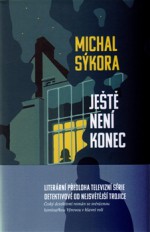
Michal Sýkora
It’s Not Over Yet
Ještě není konec
(Host, 288 pages)
A Czech detective novel starring the idiosyncratic Commissioner Marie Výrová, which the television serial Detectives from Holy Trinity (Detektivové od Nejsvětější Trojice) is based upon. Sýkora has already written two books with the same detectives, who are popular among readers and recognized by the critics. Regarding Sýkora’s previous novel, Blue Shadows (Modré stíny), Pavel Mandys wrote in Hospodářské noviny: “A plausible and non-trivial plot, with solid albeit sometimes exaggerated character details plus the art of keeping the reader in suspense.” The same goes for this novel.
It’s a hot August afternoon in 1987. The holidays are drawing to a close and twelve year old Hana Kolihová inadvertently witnesses a particularly brutal murder in her villa by the river on the outskirts of the city. The police catch the perpetrator remarkably quickly and nobody believes Hana’s claim that the murderer was in fact a strange green spirit, resembling the water-goblin from Karel Jaromír Erben’s collection of ballads, Kytice. This time, Police Commissioner Marie Výrová will be investigating a quarter-century old murder. After meeting Hana, who never recovered from the horrific experience, Výrová studies the case and realises that the investigators made a number of mistakes and that many of the inhabitants of the seemingly quiet villa may have had a motive and the opportunity to commit the shocking crime.
Praise
“A story that leads through a murder hunt down into the depths of human nature, enlivened by the author’s full-blooded writing, including some fine work with colloquial language. Michal Sýkora’s work is like Dylan’s albums Time Out of Mind and Tell Tale Signs, his Commissioner Výrová’s favourites – tranquil on the surface but dark and disorderly within.”
— Štěpán Kučera, Právo
Links
Publisher: nakladatelstvi.hostbrno.cz
-
Excerpt ▼
“Mr Koliha is here on account of an old case,” Šupina told Marie. “Try asking the Commissioner here. She’s Olomouc born and bred. I was still in Ostrava at that time.”
“Have you ever heard of that famous murder in the Třebovický family?” the writer turned to Great Owl. She had to admit in all truth that she hadn’t.
“It was a long time ago,” Koliha added by way of apology.
“What happened?” Marie asked out of politeness.
“A six-month-old child was murdered. Quite a lot was written about it at the time.”
“Here in Olomouc?” Marie asked in surprise. The writer had managed to arouse her curiosity after all. “I never heard of it. When did it happen?”
“1987. In August.”
“Aha…” responded Great Owl. “I wasn’t working for the police at that time.”
“I am interested because my wife was there at the time, as a child, of course.”
“At the murder?”
“She was at the Třebovickýs on holiday at the time. She’d made friends with their granddaughter, and on the day she was actually staying at the Třebovický’s house. She hasn’t fully recovered to this day.”
“What happened?”
“The mother cut off her own child’s head on a circular saw,” Koliha said matter-of-factly, as if it happens all the time.
Marie gulped drily. “I’ve never heard of that…”
“Mr Koliha came to ask me if he could have a look at the investigation file from that time.”
“I’d like to compare my wife’s memories with some objective view of what happened,” Koliha added by way of explanation.
“I know the Commissioner here, and when I found out he was serving in Olomouc now, I came to ask for help.”
Marie saw that her new boss was embarrassed. She had heard him say that one of his older cases, in which he had very efficiently tracked down the unusually systematic murderer of some pensioners, formed the basis for a detective story, though he hadn’t read the book, and he didn’t actually know who wrote it. And now the writer had come after him to the new Olomouc workplace to capitalize on her acquaintance again. “Was your wife the subject of the investigation at all?” she asked.
“God forbid. I only know that she testified as a witness. But if you are asking if she was a suspect, then no. After all, she was only twelve.”
“What do you think, Marie?“ Colonel Šupina looked down at Marie from his height of two metres.
“Is anything preventing Mr Koliha from showing the file?” Marie answered with a question.
“I don’t think so.”
“So I shall call the Archive, though it will certainly take some time.”
Bohdan Koliha smiled in satisfaction at Great Owl. If he ever made Marie a character then that smile ensured she would be a positive protagonist. “Not to worry.”
“Why do you actually want to see it?” Marie asked him.
“As I said, mainly because of my wife. It’s traumatized her to this day, basically because she doesn’t think the mother did it.”
(Translated by Melvyn Clarke)
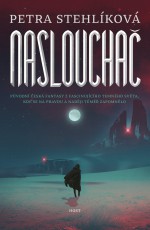
Petra Stehlíková
The Listener
Naslouchač
(Host, 380 pages)
Petra Stehlíková first self-published her books and has now been picked up by one of the largest publishing houses in the Czech Republic. From the outset her books have been successful among fantasy genre readers and young adults. After the Great War the world is divided into two parts, one is habitable and the other is contaminated by poisonous gases. The habitable half is protected by a shield that draws energy from a special mineral called glassite, but its excavation results in numerous disorders and deformities. Thirteen-year-old Ilan is one of the few to be born without any deformities. Since her childhood she has pretended to be a boy, so as not to be taken away from her family, and she hides under a habit with a mask that glass workers have to wear as a sign of subordination. Thanks to her ability to listen to glassite, she begins to learn glass polishing. She knows she has to hide her secret at any price from the twenty-five warrior foes who have enslaved her people, but she does not manage to hold her ground and slowly comes closer to these men and learns the truth that has been withheld from the glass workers for many years. The Listener is the first part of a planned series.
Praise
“…the author has created a fascinating story. The Listener is the bold equal of any foreign work.”
— Petra Machová, Dagon
Links
Publisher: nakladatelstvi.hostbrno.cz
-
Excerpt ▼
It was a breathtaking view. At that moment I was sorry there was nothing in the world to preserve the memory. My eyes voraciously devoured the hundreds of candles that glowed in their gilded stands. The hall was so vast that I could barely see where it began and where it ended. The walls were decorated with pictures painted by bygone artists. The ceiling arched high above the stone floor. The servants in their bright city-coloured costumes bustled among the guests, offering liqueurs in ornamental goblets. The women were veiled in the most beautiful supplexes that I have ever seen, as the silky material wound around them in a medley of complex folds that brought out their curves. Their long, lustrous hair was decoratively plaited, while their slender necks were adorned with jewels. They stood around in small groups, being admired, wooed and loved. There were so many of them! If I’d been a man I would not have been able to choose.
Even through the thick glass I heard laughter. It struck me they had all been preparing for this evening for days and possibly weeks. I admired their harmonious movements and gestures. I tried to imprint everything happening in front of me in my memory. For a moment I closed my eyes and yearned to be one of them. For once in my life to have a fine hairstyle and glossy hair. For once in my life not to wear the mantle.
— — —
Somebody suddenly caught me by the mantle and drew me back sharply. I let out a cry and with my other hand fumbled for the master.
A voice came out of the darkness. “What’s the rush, you dirty…?” A knife point appeared close to my eyes. It was not made of glassite. Or blacknesse. It was made of ordinary metal. But that was not the point.
“We do apologize, sir”, the master meekly started, beginning to bow. “We apologize if we have disturbed your peace and quiet. We had work…”
“How dare you hang around here? How come you are not shut up in your burrows where you belong?” the limping man interrupted the master. His face was distorted with anger and contempt. A badly healed scar stretched across his unpleasantly elongated face to his thinning, colourless hair.
“What have you got in that rag on your back, old man?” he enquired, walking up close to the master. “Give it here!”
The master stepped back a pace and his right hand reached for his back, where he felt the weight of glassite, as if he wanted to protect the stone.
“We have a task from the Faj himself, sir. It is important…”
At this moment a blow fell on the master’s face and his head turned sharply to one side. I immediately felt blood.
Agadon tumbled to the ground as he held his broken nose. I wanted to kneel down to him, but I was afraid to bend over.
“I don’t give a damn about your task, you skunk, and I don’t care a toss about the Faj. You’ve got some glassite there, haven’t you? Give me that rock! We’ll look after it better than you…”
The leader stepped towards the master. Agadon was holding the stone firmly and refused to give it up, while the man started kicking the elder in the stomach. I exhaled sharply and tried to come up with some way to help. Nobody noticed me.
Just as I was beginning to succumb to despair and about to cry out, I felt somebody’s presence behind my back. At that moment the men froze and they all suddenly drew back. At last I was able to bend down to the master and help him back to his feet.
“Really?” a deep voice rang out, dragging along like something viscous and hugging the darkness all around. It was earnest and in its own way pleasing. But it was definitely not the kind of voice that was to be resisted. It was as firm as the stone walls that surrounded the city.
The master and I turned round all at once, but we only saw a tall figure clad in a steme that came down to the ground. The rest was drowned in the darkness.
“I have the feeling that this is a master with his apprentice. They DEFINITELY know what to do with glassite, while you do not,” the deep voice boomed.
“What do you want?” the men’s leader blurted out, once he had managed to find at least a little courage, but he still kept close to his croneys. “We’re not going to share them! We saw them first! Find your own munts!”
“But I like these,” answered the one behind us, and I swallowed audibly.
What is actually going on here? Does this man want to protect us, or is he after a piece of glassite himself?
The knife appeared in the leader’s hand again. But before he managed to make any move, something whistled through the air and an arrow pierced his shoulder. He groaned, and although the wound was not fatal, he fell to the ground. The other two turned round, leaving their leader to bleed in the darkened street, and ran off back to their cradles.
Something gently moved me to one side and the man in the steme passed by. He grabbed the leader by his dirty shirt, raised him with a single hand high above and thrust him against the wall. Then he caught him by the throat. As he squeezed, a choked rattle could be heard and the leader’s legs started swinging above the ground.
“Clear off, or I shall finish you off,” the man in the steme ordered in the same calm way that my mother used to send me to bed in the evening.
The leader did not wait to be told again. When the grip on his throat eventually relaxed, he carefully stood up again and tottered off, nursing his wounded shoulder with his good arm.
The man in the steme watched as he fled, until he had disappeared into one of the special cradles, and then he turned to us. Unfortunately, his face remained hidden in the shadow. He was still clasping a small autoshoot. When he noticed I could not tear my eyes away, he hid it beneath his steme.
(Translated by Melvyn Clarke)
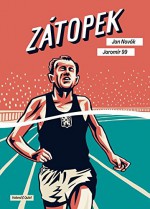
Jan Novák & Jaromír 99
Zátopek
(Argo & Paseka, 208 pages)
The Novák – Jaromír 99 team are a combination of two great names from two different fields. Novák’s books have come out in numerous world languages and he has won several important literary awards including Magnesia Litera for book of the year (2004) and the Josef Škvorecký Prize (2007), as well as the Carl Sandburg Award for Chicago authors and the Friends of Literature Award. Jaromír 99 is the author of perhaps the most famous Czech comics Alois Nebel, which has been brought out in several world languages, including German and French. He has won the Muriel Award for comics.
Zátopek is a graphic novel about the life of one of the most famous Czech athletes, Emil Zátopek, considered by many to be the greatest runner of all time. Zátopek used to say that the threshold of pain and suffering is what separates the boys from the men. Pushing the limits of the body is what made him a phenomenal runner and one of the most famous athletes. When he won the 10km race at the 1948 Olympic Games in London and finished second on the 5km track, he didn’t consider it a great achievement. At the next Olympics in Helsinki he won three gold medals and became a legend, but he also achieved a more important victory — he stood up against the Communist regime by insisting that his colleague, Stanislav Jungwirth, who was originally banned from travelling to Helsinki for political reasons, be allowed to compete. This graphic novel, which has already been published in a German translation, looks at Zátopek’s greatest achievements as well as his relationship with the love of his life, Dana Zátopková.
Praise
“The expressiveness of the sharply chiseled faces and tense muscles captures the pain and effort which sport and life require. The comics portrays Zátopek as a hero and a role-model and also hints at his weaknesses. A man who is successful due to his will but is simultaneously walking on a tightrope above an abyss where his Czech cunning helps him keep his balance”
— Kateřina Čopjaková, Respekt
Links
Publisher: www.argo.cz and paseka.cz
Illustrations
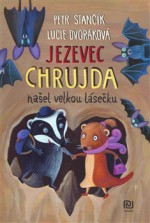
Petr Stančík
Chrujda the Badger Found his Great Love
Jezevec Chrujda našel velkou lásečku
(Meander, 24 pages)
Petr Stančík, the 2015 Magnesia Litera prizewinner for prose, writes both for children and adults. He has already published two books about Chrujda, always to the great joy of both children and critics. In this latest story the popular children’s character Chrujda from Habřinec Forest, a friendly, inquisitive builder of underground corridors and setts, falls fatefully in love with the beautiful Anička the weasel, but he is not the only one to do so. Chrujda has to fight for his love with crafty Smradolf the polecat. Our smooth-furred heroes find themselves in a secret cave full of dangerous creatures trying to do them in. Brave Chrujda beats his rival not through strength but through courage and resourcefulness, finally convincing Anička that he is the one for her. The humorous illustrations of the various creatures of forest and meadow are by the outstanding artist Lucie Dvořáková, whose previous illustrations have won great acclaim.
Praise
“This third adventure of the resourceful badger is a true heart-wringer: Chrujda has fallen in love with Anička the weasel. This simple but not simple-minded tale humorously and inventively tells how an apparently tedious type can show greatness.”
— Pavel Mandys, iLiteratura
Links
Publisher: www.meander.cz
Illustrations
-
Excerpt ▼
Chrujda the badger lived peacefully and quietly in his sett beneath a glade in the middle of Habřinec forest. But then one day a very odd thing happened… He rather took a fancy to Anička the weasel and that was the end of his peace and quiet, because that well-known good-looker and heart-breaker, Smradolf the polecat also had an eye on dear Anička.
The poor weasel was spoilt for choice. Both suitors had their pros and cons. Chrujda had a thriving business, but he was not much of a talker and just kept burrowing in the earth. In contrast, elegant Smradolf had a moustache like a propeller and danced like no one else in Habřinec. But then there was something about him that didn’t smell quite right.
It was Sunday and Anička went outside for a walk. Of course, both the badger and the polecat immediately wanted to join her. They both asked at the same time: Where are you going? The weasel answered: To a flooded cave, where I’ve never been before. Would you like to accompany me?
(Translated by Melvyn Clarke)
[ ]
